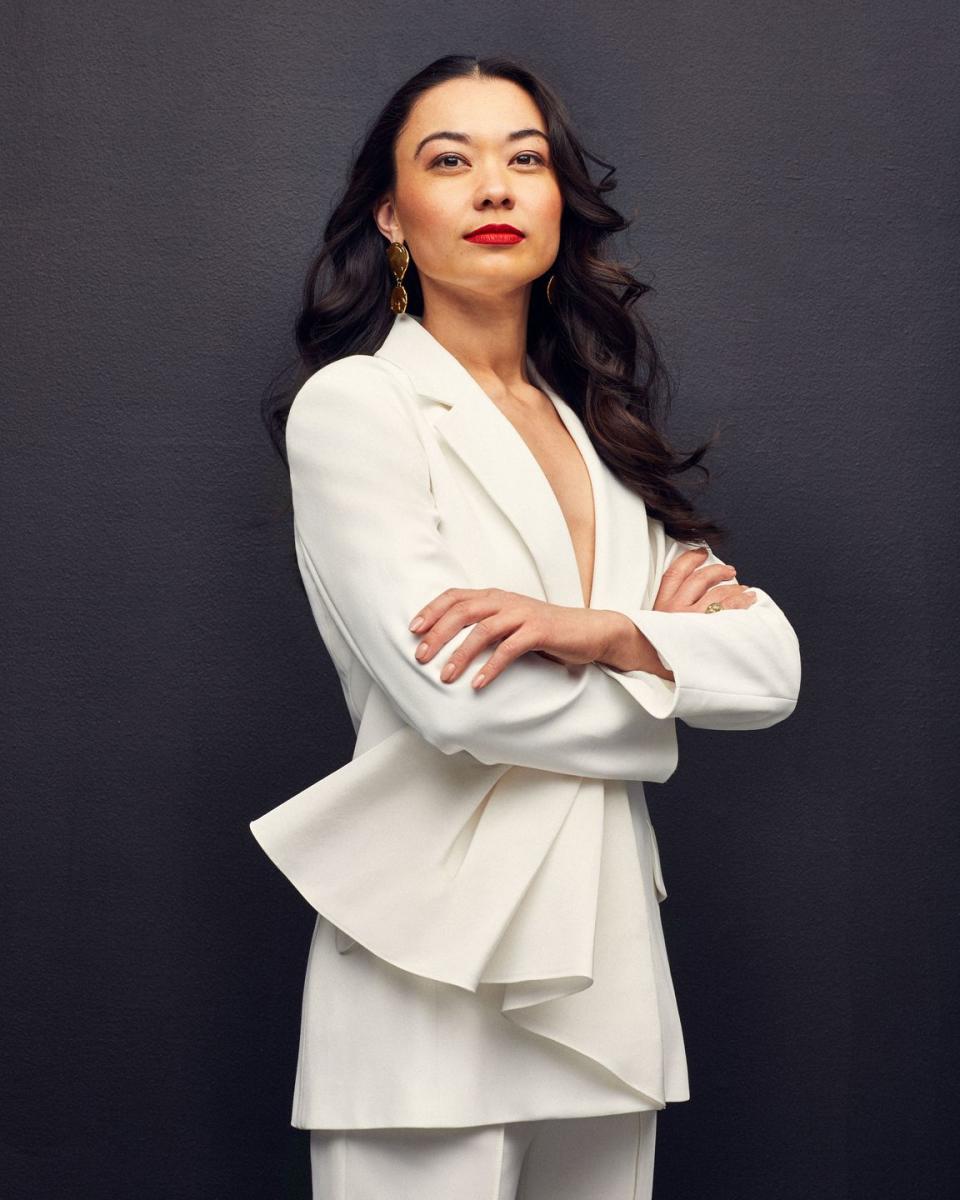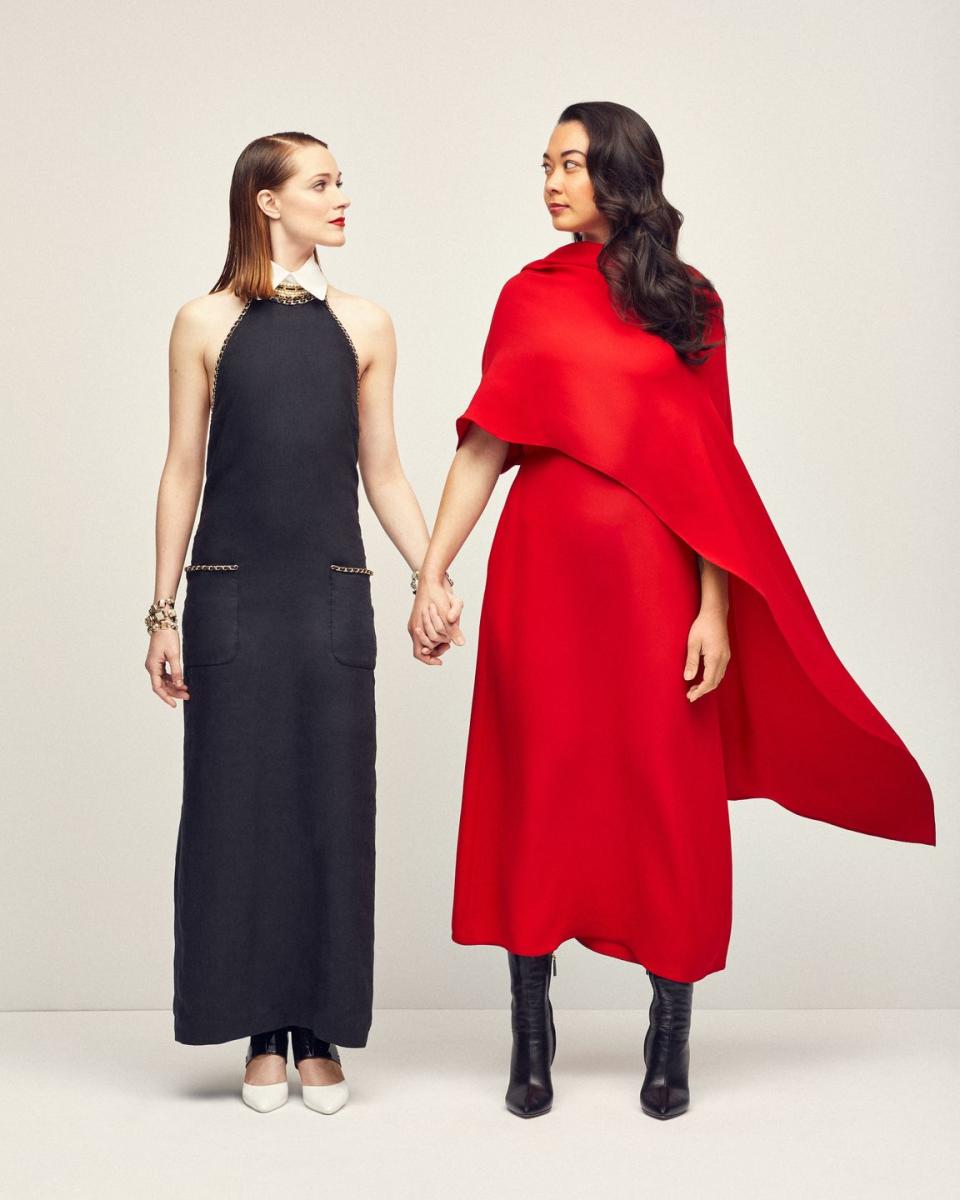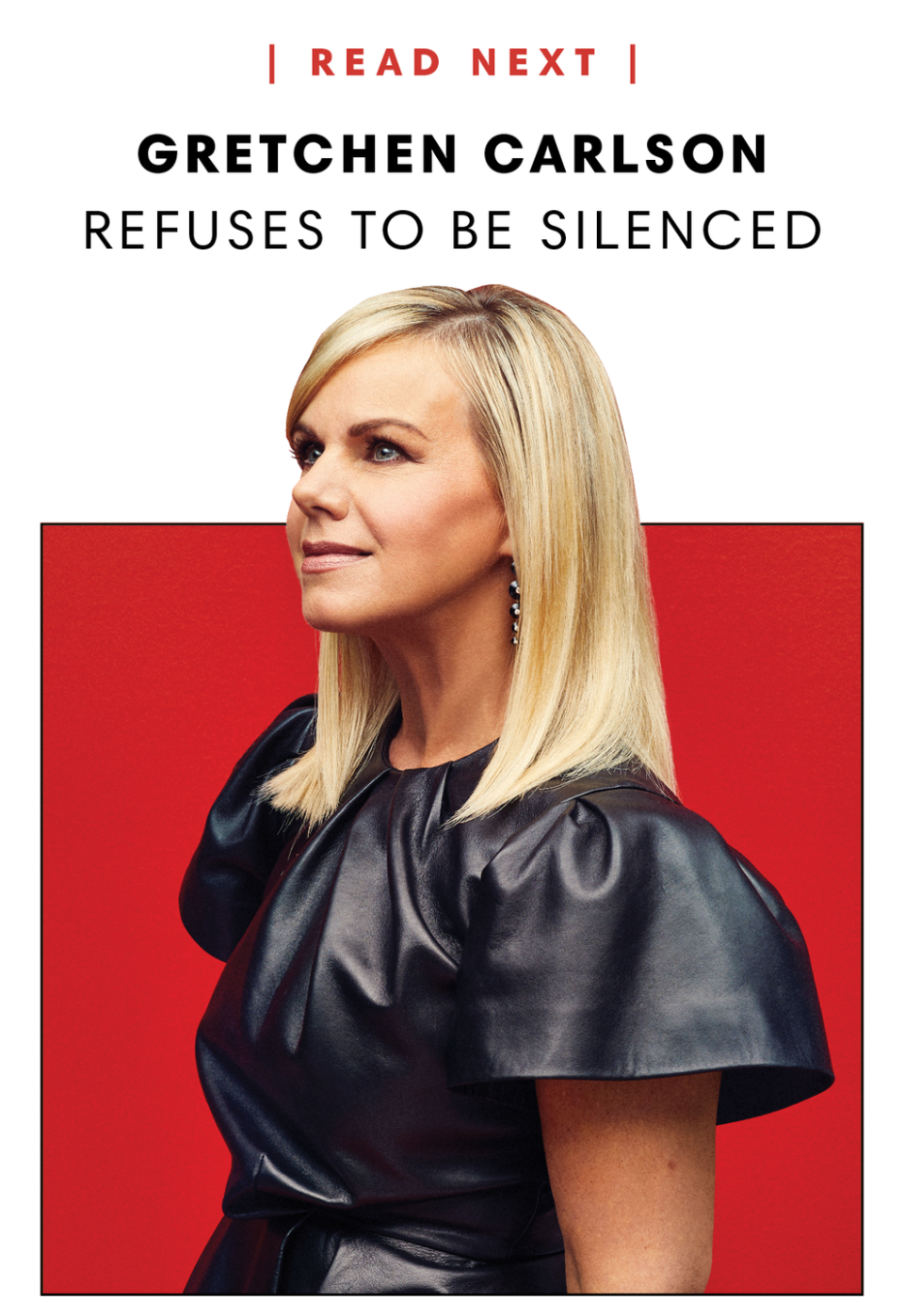Chanel Miller and Evan Rachel Wood on the Aftermath of Sexual Assault

For our 2019 Women Who Dare series, Chanel Miller, the author of Know My Name, and Evan Rachel Wood, the creator of the Phoenix Act and the #IAmNotOk movement, open up about society's perverse expectation of the perfect victim, how the justice system is failing sexual assault survivors, and why we need to start measuring trauma.
Evan Rachel Wood: There is an expectation that survivors have to maintain some kind of composure or some certain way of being for the public to feel that they are an acceptable victim. One of the scariest parts for me about coming forward was a smear campaign, or slander, or someone trying to discredit my experience because it's very re-traumatizing when that happens. No one knew I was being abused, but when the abuse was happening, in the press, it was so traumatic; they were calling me a whore, they were calling me crazy, and they were calling me names before I'd even said anything. I felt like my credibility had already been destroyed, so it made it very difficult to come out during that time. My greatest fear was when I eventually said something, that all of that was going to repeat itself. I was really scared.
I blamed myself, because I was "misbehaving," because I was doing things I wasn't supposed to, I was inappropriate, I was this, I was that. But none of that means I deserved what happened to me. It's important to say I'm not a perfect person, I haven't been a perfect person—no one has been, and the punishment should not be torture for being imperfect. I don't want to present myself to the world like I'm this pure being; I'm just me and I've made mistakes. But I know what happened to me—and I'm very clear about this—it wasn't my fault. I'm still very scared to talk about it, but I know that it's important because of this idea that you have to be this perfect being that's never done anything wrong for anybody to take you seriously.

Chanel Miller: I hate that credibility is never a given, that it seems it has to be earned, that in order to earn it, we have to prove that we can be levelheaded and obedient, that we can maintain an even temperament even when we have every right to be angry. For me, throughout the court process, I was doing stand-up comedy to keep myself alive, but I worried that if that got back to the courtroom, they could use that against me to say, "Look at her experiencing joy. How can a suffering person be getting up and immersing herself in laughter?" It's extremely sad to me that we have this expectation of how we must behave, that looking like a victim has its own identity.
Another stunning thing is that I was able to hide this for the last four and a half years. There are so many of us who are masters of concealing our stories. Much of the time, being a victim means appearing completely ordinary. We're so good at pretending like nothing is happening, like we can keep moving and functioning without missing a beat. And, yeah, in terms of being a perfect victim, I think every victim, as soon as this happens, you find ways to assign yourself blame. You can say, "I was drinking; it was my clothing; I was wearing a T-shirt of his favorite band, which might have been enticing"—we string these up on a little mobile, and we sit beneath him, and we watch it, and we let it consume us. Meanwhile, the real reason is just running off free. We don't assign blame to the source for so long, and that's extremely upsetting.
Evan: We just need to be listening to survivors. We keep saying, or assuming, that you should be reacting a certain way. Even after an assault, people think they would react differently in that situation where they don't understand why you wouldn't call somebody right away or why you wouldn't do that. In my case, the statute of limitations had run out on my case. I didn't report it in time, and a lot of people are very confused by how that could possibly be. "You should have gone to the police right away," they say, but it's just coming from a place of ignorance and not malice. I think people just don't understand the process that you have to go through, the fear that you have to go through, the trauma that you have to work through, so I'm just happy that these conversations are starting to happen. But we do need to be listening to people who have actually experienced it, because they can tell you what the experience is like. You shouldn't be assigning one to them.

Chanel: Yeah, even if a victim appears flat, it's not because she's unaffected. We all process things differently. Maybe your instinct is to withdraw in an act of self-preservation. I also know that a lot of the times after a bodily violation, victims may turn to toxic sex or drinking, because you already feel like you've been deemed worthless, or you feel dirty, or you feel like there are things inside you that you cannot tolerate, and the only answer is to vanquish them, or to punish yourself, or to obliterate them in any way that you can. It's infuriating that we use that behavior as further proof that this is why she deserved it; we point to it and say, "Well, see, this is the type of girl who this happens to," when really the root of it is the violence itself. It's not her flaws, it's not her misguided judgment; it's the violence that prompts this behavior, and we have to acknowledge that.
Evan: Absolutely. I also use humor a lot, and I think it confuses people. Even during some of the darkest times when I was being abused, I remember making jokes during it, gallows humor. It was because I felt so trapped in that situation. If I could make a weird joke and laugh, it was the only thing that could get me through and keep me somewhat holding onto one little piece of sanity. But it's that nervous kind of sad laughter. And I still do it, and I think it does sometimes confuse people. But anybody who knows me knows that I will make a joke in the darkest situation; it's just how I process things.
Chanel: Yeah. You have to. If you're being held underwater, it's like your little straw that you're breathing through, a little bit of air, a little bit of life. Life is really ridiculous half the time, you can't take yourself so seriously. And what's beautiful about it is that it is messy and that it is colorful and that we do make mistakes—that's part of growing up, but making a mistake is different than committing a crime. Drinking too much is not punishable …
Evan: It's not a crime.
Chanel: … by law, yeah. And we need to be able to separate this.
Evan: Everything you say can be used against you and twisted. I haven't seen Unbelievable yet, and I actually have spoken to a couple of survivors who haven't seen it, because I think it's something you have to be in the right state of mind for and ready to dive into, and some survivors said, "No, I already know what it's about, I don't need to watch it." But I do want to see it. It's very important for the rest of the public to watch, and same thing with the R. Kelly footage and when the survivors' stories came out … I watched all of that, and I encouraged everybody to, because it's rare to get to see what happens behind the scenes or go into that inner journey of a survivor. If you're just listening to what the press is writing about, it's such a condensed, basic version of what happened. These crimes are so complicated, you need the details, you need a long-form story to really even grasp the whole picture. I feel like the Surviving R. Kelly documentary really did that well; they had experts come in and walk people through how these situations come to be, what happens to a person when they're in it, and that's what we need to be doing now—really walking people through it.

Chanel: Like you said, the media bullet-points it, it writes the headlines. I'm more interested, if you're called to testify for the preliminary hearing, what happens after you testify in those empty months where you're waiting to be called back to testify for trial. Maybe there's nothing to report on, maybe it's mundane, but that is where we need to be looking. How is the victim taking care of herself? How is she keeping herself mentally stable? How is she healing, and how is that healing going to be disrupted when she's forced again and again to repeat her case? How do you move on in a situation like that? I think the media swells, it comes and it goes, and you're left trying to put everything back together again.
Evan: It's funny, I experienced a very similar feeling after the Phoenix Act got signed into law last month. It was this huge moment, and we were all so happy, and the whole year of work had come to a head and we did it. And then I was left alone by myself in my house with this really strange feeling of, right. It's almost as if I was naively subconsciously expecting everything to go away once that happened, and then it was this reality check of, oh, no, no, all that still happened to you, and you still have to deal with that for the rest of your life. You're still working through this, you're still going to have to pick up the pieces. And you've moved progress forward, and that's amazing, but it was this kind of, oh, right, it actually doesn't help me personally, but the reason I did this was to help other people.
Chanel: I think what happens externally is on a separate timeline than what happens internally. I felt the same way when I got the verdict. I thought, Well, this solves everything, what a perfect ending. And then I went home, and I remember my therapist saying, "Well, now your healing can really begin." And I was like, "What do you mean begin? I'm done." But it's, you can finally turn and face the rest of your life and figure out how your experience will continue to play out, where it will live in your life, how it will continue to inform you.
Evan: I think consciousness is changing, and now we have to put that into action, in prevention and education and better legislation. I did not want to do any of this; I wanted to just raise my kid and not have to do this. But it felt involuntary, it felt like I didn't have a choice. This thing had happened to me, it was this moment in time, and I had privilege and I had power—if I wasn't using it, then what the hell am I doing? I think a lot of people are in that place in one way or another, so I think now we need to be having the conversations of, "Okay, but what's really the problem, and where does it stem from, and how do we stop it before it starts, and how do we create this cultural shift and this different way of thinking, and the way we socialize boys and girls?" That's the next step.

Chanel: I felt that same duty to report on what was happening to me. I felt like by going through the criminal justice system, I was in the smallest percentage that even has the opportunity to see what it's like inside a courtroom. So if I have this experience, I need to really confront it and figure out how to share it; otherwise, it's lost information. And in terms of mind-set shifts, I think so often, victims think that they haven't done enough, that they didn't wear enough clothing, that they weren't clear enough about what they wanted or didn't want, that they didn't report fast enough, that they didn't collect enough evidence, but it's always the victim who hasn't done enough. And I want to make it clear that we are doing plenty. Every time you share your story, that is so immense. It takes so much out of you, and just showing up to face whatever day lies ahead of you, that's doing plenty. And it's time for everyone to listen, to step up and understand that we're all in this. Everybody knows someone who's been directly affected by this; it's not us who are not doing enough, it's society that needs to step up.
Evan: Yes. We need to stop putting all of the responsibility on the survivor's shoulders.
Chanel: We bear everything all the time just to say, "Can you see that this matters? Does it matter to you? Can you hear me? Can you see me?" People need to see us.
Evan: I get a lot of people asking why I haven't named my abuser, and actually reading your book, you said, "I want to name myself first," and that's it. That's exactly why I need to name me first and my story, and to help other people. Part of my story is that I'm too afraid, and I forgive myself for that, and I know that's not my fault. I don't feel safe. And that's one of the reasons I wrote the Phoenix Act. So when people ask why I haven't named my abuser, it's because I can't. I just don't feel safe enough, and that's part of the problem. I created the Phoenix Act to give people more time, because it took me so long to process everything and to get to a place where I felt even safe enough to speak about the abuse. And it's scary. I mean, he definitely knows that I'm talking about him, I'm sure he's caught wind of it, and that's a terrifying thought. But again, the reason that I really decided to go [public] with this was because I found out he had abused other women. That changed everything. It helped me feel stronger, because it wasn't just about me—I'm not just fighting for me anymore.
Chanel: Naming comes at a cost. When people say, "Oh, she's going after him," really, you think we go into attack mode? Do you know how terrifying it is, do you know how much we sacrifice, how afraid we are of retaliation that we're pretty much promised from the very beginning? We are just speaking because we have to maintain our own sanity, because we can't contain these stories. It's not revenge to me; that's such a small way of thinking, and it takes the center off the victim. We speak in order to breathe, and we remain the protagonists of our own stories. We do not exist to be a side character in his story or his victim, we do not belong to the people who hurt us, and we continue to own and control our own narratives, and they get to be on the sidelines for once.
Evan: While going through the process of speaking to people behind the scenes who create laws and whose jobs are to make sure everything's fair, the problem I kept coming up against every time—the main one that upset me the most and that made me realize, oh, this is a bigger problem—is that we don't want to send people to jail. The system is really clogged, and there's a lot of systematic racism, and there's a lot of unfair drug charges. And from what I can tell, there are so many cases of abuse that if we were to let them all in [to the prison system], it would flood. So we play down domestic violence and rape, because it's so rampant that they don't want people to know what a problem it is, because they don't want to send people to jail.
Instead, they put every hurdle in front of the survivor, including discrediting you to make sure that [sending them to jail] doesn't happen. I think one of the weapons they have is, "Well, but look at his bright future; we don't want to ruin that"—and that's also because there's not a lot of rehabilitation. Sometimes people go to prison and they come out worse, there's so many issues. What I kept noticing was, oh, you actually have no incentive to send people to jail, and for people to be accountable, because it's easier to let victims suffer in silence than to have to deal with the actual problem, which is so much bigger. This is opinion of mine from my experience, but that is something that I have noticed.

And there's a lot of good laws that can't be passed, because they will target minorities with them. I had a lot of ideas of how to strengthen the laws around domestic abuse, and we would get feedback of, "This is great, but we can't pass this." And I'd say, "Why? It's common sense." And they'd say, "Yeah, but some people will use that the wrong way, and so we have to hold progress back so that minorities aren't targeted." Things like three-strike rules, which are already used against minorities. Another reason why I advocated for a longer time for victims to report is there are also communities that do not want swift action from law enforcement, they're afraid of law enforcement, so they're less likely to call the police or to report. There's a lot of communities where you're a snitch, and the saying is, "Snitches get stitches." So there's a culture of silence that a lot of people are born into, because they don't trust law enforcement. There are multiple reasons why people need more time.
Chanel: I think in this system, people of color are often demonized or deemed as dangerous, whereas in my case, my perpetrator was very quickly humanized. He was never labeled as a criminal, he was labeled as a young person who had simply lost his way, but this didn't define him, this shouldn't realign the rest of his life. They treated it like this is a temporary lapse in judgment, this is a quick deviation from his behavior, but at the end of the day, he remains a model citizen were it not for his one-time mistake. And that to me is the difference, the labeling of criminality versus excusing in the guise of humanity, you're just a human. We get it, we make mistakes, that sort of empathy that's extended toward him.
Evan: And not usually to the victims. Money has a lot to do with it as well. If you have a lot of money, you can get away with a lot, even bail. The justice system is set up for rich people.
Chanel: Yeah, I mean, he was held on five felony counts and was released in less than 24 hours.
Evan: That is so … I'm so sorry.
Chanel: Even hiring a blackout expert for $10,000 to testify in trial. I mean, how do you justify that?
Evan: There are people in jail for pot for life, and those cases, we still haven't overturned. The thing that should really bother people is if you look at the sentencing for other crimes, there's harsher punishment for nonviolent crime. I don't know what the solution is, honestly. Again, it's a way of thinking, it's a cultural shift.
Chanel: I think the issue, too, with the light sentencing, I mean, it was light … he served three months for three felonies, so that in itself is light. But what bothered me more was that [his sentence] had failed to calculate not only the assault, but the aftermath of the assault, which we fail to acknowledge so much of the time. The fact that it took 18 months of my life even to get to that sentencing … we're not incorporating all the harm and emotional damage that is accumulating in your quest for justice; that is largely overlooked.

Evan: That's a really great point. That time should be accounted for in his time. I think part of the problem is we haven't found a way to measure psychological trauma, and we're terrified to define it in law, because it's not tangible. They'll measure abrasions with a ruler, but how do you measure what happens to your psyche? The scars on your psyche … your mind actually changes after you've been traumatized. I still have to undo ways of thinking and thought patterns that have been drilled into my mind because of something I didn't choose. Those are the moments in which I get angry, when I'm still left with this mental aftermath. I still have to live in the same city as my abuser, and I don't have protection.
When you've been abused by somebody in a position of power, a restraining order is not going to help you. If they have a whole network of people, and they're connected to gangs, or they're connected to other bad people, [a restraining order] doesn't really matter. Even if they personally don't come after you, they might send somebody else to, and they might send somebody to hurt your family. My abuser's threatened me multiple times, threatened my life, threatened my family's life, and when I did decide to speak to a lawyer about it, and I thought about saying their name and I said, "Well, can I get a restraining order?" They said, "Well, how long ago was his last threat?" I was like, "Well, I don't speak to him anymore. It was the last time I saw him, years ago." Unless the threat's been made recently, you still can't get a restraining order.
Chanel: It has to be an explicit.
Evan: I mean, I've been threatened so many times I can't even really count anymore. When there's a threat against your life, that doesn't expire. Sometimes I'm terrified to go outside and even get a package. I still have moments of PTSD when the sounds in my house are loud, and I'm convinced I hear footsteps. I'm convinced someone's coming to get me. Even though intellectually I know this is my PTSD, I still have to sit there and sweat and go through it, it's something that's involuntary. My abuse happened over a decade ago, and I'm still dealing with that; we can't measure that, we can't charge that, it's not defined. I think a lot of victims will tell you that sometimes the scars on your mind are so much worse than the physical ones, but we only take into account the things we can see and measure with a ruler.
Chanel: Beautifully said.
Evan: I don't know what the future will be like, but right now I think it's, like you said in your book, I want to name myself first, I want to tell my story. I'm not quite ready for it to be about [him] right now.
Chanel: You also get grouped with your abuser, or your photos go up together in the headlines, and you want to be able to create that separation to not be constantly alongside him. You're worried about just being able to live inside your house, to pick up a package without having to look over your shoulder constantly. That's a very simple ask, but it's not something that we're always given. And it infuriates me when I see people like [Brett] Kavanaugh getting so angry over reputation damage; meanwhile, we cannot get even a sliver as angry for bodily violation, and that continues to be the case.
I talk about catcalling in the book and how I began to question how much we're expected to tolerate, how much we are expected to absorb. We're taught to keep our heads down and to not be confrontational or to endanger ourselves by talking back, starting that fire—but really, he's starting the fire, and we're trying to speak up for ourselves. I think so often in those situations, you would be blamed for talking back, or being rude, or not just going on your way.
Evan: Oh, yeah, you're immediately met with anger and hostility. Because I am bringing up a son, I try to understand the behavior, and to go, "No, that was not okay, but why do you feel the need to get angry at me? What is it inside of you that is empty and that is hurting and that didn't get nurtured, and wasn't empowered to know that you have so much more value than what you're projecting into the world right now?" I don't know. This is coming from somebody raising a boy, that's how I try to think of it.

Chanel: I think what's changing is that we are putting the responsibility on men to amend themselves, to look internally at why they're doing this to us, because we don't want to hear it anymore.
Evan: And in a culture that teaches men to not look internally and to not ask themselves these questions, to not think about their emotions or feelings, or how their behavior stems from something else, it's also just giving them that language and making room for accountability. Sometimes it's hard not to be angry, but again, I think it's … I don't know, showing them that way into themselves, giving them a language, teaching them how to ask themselves those questions and how they can change by saying, "I don't think you're a monster, but I think you need to go inward a bit; I don't think you've been taught how to do that, and that's sad." That's a tragedy in itself, and a lot of women bear the brunt of that. That's why I really try to advocate for prevention, because these things are instilled at such a young age, and the older you get the harder they are to undo. And there's all this stigma around therapy, and there's all this stigma around getting help. A lot of that needs to change.
Part of the way we socialize boys, and this is just coming from the men who I've spoken to, they were shamed if they didn't act a certain way around their male peers, away from women, and calling out that behavior is just as important as if you see something bad happening to a woman and you want to step in to save the day—yes, that's obviously amazing and great, but you also need to do it behind closed doors when there are no women present. That's when you're really going to have to be brave. Thy call it the man box, you get stuck in this man box. A Call to Men is an organization that teaches men different techniques and coping mechanisms to help them understand why they may behave in a certain way, and they say to get out of the man box takes bravery, to step out and go, "Actually, maybe we shouldn't talk this way, it seems a little offensive. No? Anybody?" I think we also need to start framing this as a man's problem as well, and not in the way that they're the bad guys, but in a way that nobody is born hoping to grow up to be a rapist. Something happens to a boy that turns him or makes him think that this is acceptable, and that in itself is a tragedy, that we've lost a young boy to society or to a culture that accepts this, that tells him that there's nothing he can do, that's just how he is, and that's just how men are, and that they're terrible, and there's no real incentive there to change. I just hope we can teach men that they're valuable.

Chanel: That was wonderful.
Evan: I still get shaky when I talk about this stuff. I feel okay, but my body still …
Chanel: Doesn't like it.
Evan: … knows.
Chanel: I talk about it, revisiting the trauma, almost like an undertow, something that pulls you out into the water, and you have to constantly keep coming up for air and resurfacing. But what changes is how quickly you are able to resurface each time. And even when I was writing, I thought, I have to describe the initial assault, I have to describe it again in the preliminary hearing, then the trial, and the sentencing, and I thought, How do I continue to tell the same story over and over again without making it boring, without simply repeating facts. And what I learned is that the facts remain the same, but you are changing within that story. Pay attention to how you are growing, to how you are gaining power, all those subtle shifts are happening, even though it feels like everything is repetitive, even though each time you feel like you're back at square one, you're having panic attacks again. It's okay to reimmerse yourself in it, as long as you know that you are not the same person as you were the first time, that each time you're revisiting the experience, you're coming away differently, and you're coming away a little more powerful than you were before, because each time you resurface, you think, Wow, I did that and I'm still here. So pay attention to your power.
Evan: Sometimes when I start to spin out, I'll read something or listen to a podcast, or I'll listen to an audiobook that describes what I'm going through that will break the trauma down for me, will break down the experience, and then that calms me, because I can put words to what I'm feeling. And it makes me not spin out and feel out of control. That really helps. I think you're right that every time you tell your story, it's different. I've testified a few times now for the bill, and every time I think, This time's going to be easier, because I've already done it once or twice, and it's always just as hard. It's always such an intense experience. But it is always different, and I do walk away with this bittersweet feeling of, I'm so sad that this is my story, but I'm so proud of myself that I said it and that I feel heard. That was the most gratifying thing for me throughout the process.
I definitely had people try to block us, come up against this. I've been yelled at, I've been told that I'm fake—you have to deal with a lot of that, and a lot of naysayers and people who try to take your truth away from you. But if you are telling the truth, there's nothing anybody can do to throw you off course. And if you can just sit in that and hold onto that, it doesn't matter what anybody else says. The greatest thing I took away from my experience was being able to sit in a room full of people who can create change and just tell my story. Even if they voted against the [Phoenix Act] bill, which they didn't, but even if they did, just knowing that people were stopping and listening to our stories, that meant so much. I didn't realize how much it would mean just to have somebody listen to you and to validate your experience. That's so much in itself.
Executive Editorial Director: Joyann King | Photography: Allie Holloway | Chief Visual Content Director: Alix Campbell | Senior Visual Editor: Lauren Brown | Styling: Cassie Anderson | Stylist Assistant: Danielle Flum | Design Director: Perri Tomkiewicz | Designer: Ingrid Frahm | Digital Tech: Tim Mulcare | Photo Assistants: Matt Lamourt & Angela Cholmondeley | Director of Photography: Michael Sassano | Video Editor/Colorist: Erica Dillman | Hair (Chanel Miller): Charles McNair at See Management for Oribe | Hair (Evan Rachel Wood): Riad Azar at Art Department for Bumble and Bumble | Makeup (Chanel Miller): Jessica Smalls for Armani Beauty | Makeup (Evan Rachel Wood): Quinn Murphy at The Wall Group | Special Thanks to ROOT Studios
You Might Also Like

